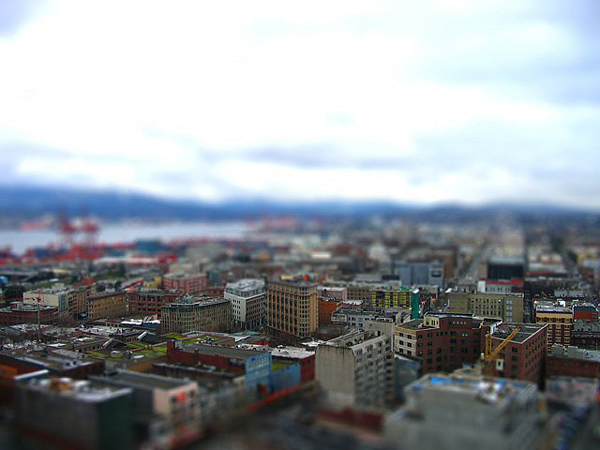Don't be too surprised if BC NDP leader Adrian Dix is dogged during the upcoming election campaign by far-left demonstrators waving placards that read: "NDP=Neo-Liberalism Democratic Party."
A group of poverty activists best known for their aggressive battle against gentrification in the Downtown Eastside wants to turn social housing into an election issue for current front-runner Dix and the provincial NDP.
They've created a group called Social Housing BC, which is calling for the creation of 10,000 social housing units a year, at an estimated annual cost of $2 billion.
"We haven't heard anything from the NDP on social housing yet, and that is why we need a grassroots campaign to build political pressure," said Ivan Drury, a controversial activist with the Carnegie Action Project, which helped create Social Housing BC last fall.
"If the NDP doesn't step up, it's not going to be clear to any working class or low-income people in this province as to why they should vote for them."
Drury and other anti-gentrification activists linked to the Carnegie Action Project are not short on outrage or belligerent theatrics.
They've vigorously hounded the centre-left Vancouver Vision city council -- especially councillors Kerry Jang and Geoff Meggs -- calling them agents of "neo-liberalism" and sell-outs to condo developers. They've fought back -- so far, unsuccessfully -- against the concept of a mixed-income Downtown Eastside, as promoted by the late Jim Green and embodied by his Woodward's housing project, an experiment which created over 200 social housing units but which the activists loathe.
Vision councillor Jang, in response, has accused Drury and other anti-gentrification activists of "co-opting the poor and the mentally ill to push their political agenda."
Drury lamented that social housing is a "dying idea," saying that "unless we have immediate action... the idea of social housing is going to be lost."
The advocacy group initially called for the creation of 2,000 new social housing units annually in Vancouver and 1,000 elsewhere in B.C. But Social Housing BC boosted its goal this week to the more headline-grabbing figure of 10,000 -- and is urging political leaders to address the issue.
Drury has also faulted the NDP for not committing so far to raise welfare rates. A group of activists staged a small demonstration at Dix's constituency office last week, urging him to promise that an NDP government would boost social assistance levels.
Waiting on the budget
Dix's approach to social housing and homelessness remains unclear. He based his leadership campaign around the issue of social inequality. But as leader, Dix has promised a modest agenda with a campaign slogan -- "Change for the Better. One Practical Step at a Time" -- that seems geared to winning over middle-class swing voters uncertain about the NDP's commitment to fiscal moderation.
NDP MLA Shane Simpson said the party will roll out an affordable housing strategy closer to the election and that social housing will be one component. The NDP won't set any social housing targets, added Simpson, until after the BC Liberal government brings down its provincial budget on Feb. 19 and the state of the province's finances becomes clearer. "We haven't landed on a number yet."
Simpson added: "We are being cautious about committing specific amounts of money until we get an idea of how serious the budget question is."
About the demand from Social Housing BC for 10,000 units annually, the NDP MLA said: "It would be a big challenge to do 10,000 a year. I have no qualms with the call or people expressing that demand. But the reality is that 10,000 a year is an awful lot of housing."
BC Liberal Housing Minister Rich Coleman called the group's 10,000 target unrealistic, saying the annual cost would be $3 billion, not $2 billion. Social Housing BC said their $2-billion figure depends on the donation of land by the City of Vancouver and other local governments.
In 2011/12, the B.C. government invested approximately $142.6 million to provide subsidized housing for more than 25,800 Vancouver households.
An average of 1,000 to 1,500 new social housing units were created in B.C. in the 10 to 15 years prior to the 1993 withdrawal of federal funding by the then-Liberal government in Ottawa. NDP governments funded a social housing program in B.C. after the federal pullback -- building slightly more than 600 units a year through the mid-to-late '90s.
The BC Liberal government under Gordon Campbell called off all social housing construction projects in the works shortly after taking power in 2001. As homelessness numbers began to climb, provincial money re-appeared for social housing. And as the 2010 Winter Olympics approached, the BC Liberal government jacked up spending on social housing to meet commitments around social inclusion for the Games.
The province bought two dozen hotels in the Downtown Eastside, as well as buildings elsewhere in the province, and committed to building 14 social housing sites in Vancouver on land provided by the city.
Under the NDP, social housing projects were geared to a broad swath of low-income residents, including families and the working poor. Under the Liberals, housing subsidies have been focused more at the poorest and those incapable of finding homes on their own: the mentally ill, the drug addicted and seniors.
Social housing in B.C. is financed through BC Housing and typically includes public, non-profit and co-op housing programs. This is long-term housing with rent geared to 30 per cent of total household income, below a certain limit. BC Housing says that it provides social housing for 40,940 low-income households.
The left-wing Canadian Centre for Policy Alternatives argued in a 2010 study that BC Housing's definition of social housing is too expansive. The report found that while the number of households assisted by provincial housing programs increased by about 11,530 in the previous five years, there was only a net increase of 280 units of what was traditionally understood to be social housing.
NDP 'dampening expectations': CCPA's Klein
On Tuesday night, Social Housing BC held a meeting attended by about 100 people at the Vancouver Public Library. Drury spoke to them about how Vancouver has moved from being a city based on resource extraction to a "neo-liberal" one based on finance, services and real estate speculation; all of which, he claimed, has led to downtown gentrification and homelessness.
"We need homes, not investments. And we need people, not profits," Drury told the crowd.
Former COPE councillor Ellen Woodsworth, who also attended the Social Housing BC meeting, said that social housing is a "sleeper" issue that will pick up steam and that she understands why the NDP would approach the social housing issue with some caution.
"It's very clear the BC Liberals are in attack mode, with TV ads similar to what Stephen Harper used so successfully," said Woodsworth.
"I'm sure the NDP has a week-by-week strategy and will roll things out closer to the election. But they are not going to give the Liberals any more ammunition than they have to."
Seth Klein, B.C. director of the CCPA, also attended the meeting. About the NDP's intentions, Klein said: "I'm not assuming anything at this point. At the moment, they are dampening expectations and saying wait for the platform."
Klein said that even if the NDP commits to maintaining capital spending at the same level as that financed by the BC Liberals, "that actually creates billions of dollars of space" that could go to social housing and other anti-poverty measures. ![]()
Read more: BC Politics, Housing, Municipal Politics, BC Election 2013
















Tyee Commenting Guidelines
Comments that violate guidelines risk being deleted, and violations may result in a temporary or permanent user ban. Maintain the spirit of good conversation to stay in the discussion.
*Please note The Tyee is not a forum for spreading misinformation about COVID-19, denying its existence or minimizing its risk to public health.
Do:
Do not: